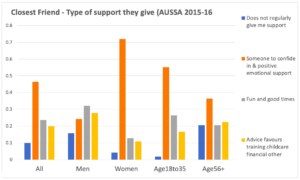This page contains survey data and graphs that I have produced throughout the course of various research projects.
Which friends do we want? (14/12/21)
An indicator of preferred friends can be found in examining the main support Australian friends give each other. I present such data below from analyses I have run on a module of the Australian Social Attitudes Survey (AUSSA) from 2015-16 (n=515). The results show that the main form of support received from close friends is most commonly (i) having a confidant that provides emotional support, then (ii) fun and good times, and then (iii) favours and advice of various kinds.
However, this varies by background and life stage. Women are much more likely to have a confidant who provides emotional support as their closest friend, while men are more likely have friends who provide fun, good times, favours and advice – or no regular support at all.
Younger people (age <36) are also more likely to have a confidant, emotional support, fun and good times, while older people (age 56+) are slightly more likely to receive favours and advice, but are much more likely to lack a close supportive friend.
